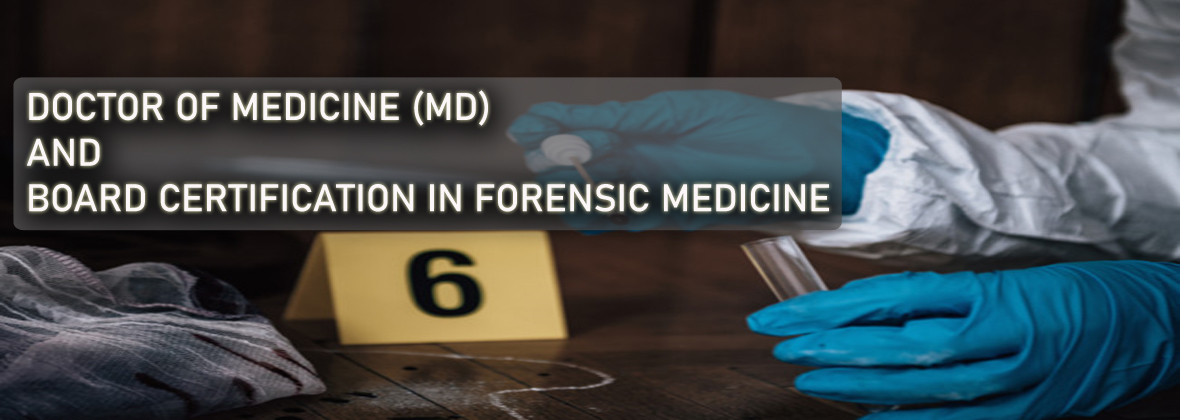
![]()
The specialists in Forensic Medicine in Sri Lanka provide their expertise and expert opinion both in criminal and civil investigations and court trials in an increasingly complicated world of crimes. Unlike in some developed countries, they provide their services both in the spheres of Forensic Pathology and Clinical Forensic Medicine. As a result of the rapidly changing complex political situation in the country, they should not only work impartially and independently but also it should be seen as such by the public. Ability to work as a competent specialist in the field of Forensic Medicine is underpinned by the subject expertise, personal virtues and professional qualities of honesty, integrity, accountability as well as respect for good medical practice and human rights. Therefore, the Specialist in Forensic Medicine needs to acquire an expert knowledge in theory and competence in technical skills of the art of Forensic Medicine as well as solid attitudes in personal virtues, medical ethics and human rights.
The mission is to promote excellence in the practice of Forensic pathology and Forensic Medicine in Sri Lanka and the region, and to be responsible for maintaining standards through training, assessments, examinations and professional development.
An accredited MD in Forensic Medicine training program and examination leading to Board Certification as a specialist in Forensic Medicine is for Sri Lanka to provide a standard medico-legal service throughout the country on par with the global developments in the field. Presently majority of the 20 million population does not have access to the services of a specialist in Forensic Medicine. Therefore, this should be a sustainable program to ensure continuous availability of experts with a comprehensive specialized training in Forensic Medicine to assist the administration of justice. This MD in Forensic Medicine is structured and comprehensive and is offered at postgraduate level in Sri Lanka.
Recently changes have been introduced to the postgraduate training programs locally as well as globally so that expectations of the patients, clients, criminal justice system, employers and Higher Education sector are fulfilled. When developing this MD in Forensic Medicine program several concerns were taken into account. They included the proper administration of justice by maintaining a specialized medico – legal service, contribution of specialists’ expertise for the advancement of the specialty in Sri Lanka, to provide necessary advice to policy makers on the furtherance of the discipline with a view of upgrading the human rights status in Sri Lanka. In order to achieve these, UGC and PGIM guidelines and recommendations, comments and suggestions made by the external examiners of MD Forensic Medicine have also been taken into account. The MD is the highest academic qualification which is a prerequisite to undergo post MD senior registrar training (local and overseas) and obtain board certification as a specialist in the subject. The board-certified specialist in Forensic Medicine is the authority of the subject.
Previously, entry into the MD training program was provided automatically to all those who successfully completed the Diploma in Legal Medicine. Entry to the proposed standalone MD Forensic Medicine training program will be through a separate selection examination, since the one-year Postgraduate Diploma in Legal Medicine program which commenced in 2015 is now distinct from the MD Forensic Medicine and provides the candidate with a basic post graduate training to handle ordinary medico-legal work. Furthermore, they could be attached as assistants to Board Certified Specialists in institutes where the workload is high. The selection examination for the diploma has less stringent criteria due to this distinction between the two.
![]()
The aim of the MD in Forensic Medicine program is to develop a postgraduate in ForensicMedicine and toxicology who is,
- an expert with theory and evidence-based practice in Forensic Pathology and clinicalforensic medicine.
- a reflective practitioner with the propensity for life–long learning as a practitioner offorensic medicine.
- a critical thinker with problem–solving and analytical skills specifically in the field ofForensic Medicine and a Professional in general.
- a Professional with adherence to legal, ethical and moral norms of practicing ForensicMedicine
- a leader with management, teamwork and collaborative skills in the context of forensicmedical practice and in wider healthcare practice.
- a researcher who generates new knowledge in the field of forensic medicine.
![]()
To be eligible to sit for the Selection Examination, applicants shall:
- be a medical graduate, who is fully registered with Sri Lanka Medical Council.
- obtain at least one year of work experience post internship which is acceptable to the Board of Study.
- comply with all rules and regulations stipulated by the PGIM.
Notes:
- The criteria prescribed in paragraphs (1) and (2) shall be fulfilled by the applicant as at the closing date of applications for the selection examination.
- Foreign nationals, who posses a medical degree which is acceptable by the Sri Lanka Medical Council for its full/ provisional registration, shall be eligible to apply for the selection examination.
- Candidate shall not have past criminal (Penal Code) offence convictions.
Please refer to the relevant prospectus for the most up to date information. The prospectus of a particular programme contains official information pertaining to a programme approved by the Board of Management, University Senate and the University Grants Commission